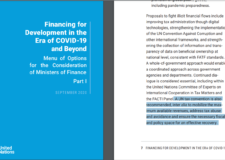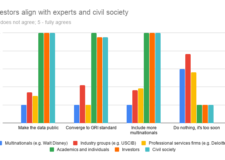Welcome to the Offshore Wrapper, our weekly round up of news from the world of tax justice. If you would like to receive the wrapper directly in your inbox every week, sign up to our email list.
Tax havens disappear
This week saw the most recent instalment of the OECD’s regular publication – empty lists of tax havens.
In response to the Panama Papers last year, the G20 tasked all countries to implement global transparency standards, and for the OECD to report back to them on which countries had failed to come up to scratch.
These standards are there to allow countries to get information about their taxpayers’ offshore holdings.
Ahead of next week’s G20 summit, the OECD has published its list, and there appears to be only one country in the world, Trinidad and Tobago, which has failed its test. The OECD has hailed this as ‘great progress’.
This is not the first time the OECD has embarrassed itself by declaring a premature end to tax havens. In 2012, the organisation declared that all countries had taken sufficient measures to remove themselves from its tax haven blacklist.
And then we had Swissleaks, BVI leaks, Luxleaks and the Panama Papers.
Back in 2012 the OECD got things badly wrong when it set the bar ridiculously low. All a country had to do to remove itself from the blacklist was to sign basic information exchange agreements with a handful of countries. Today the empty blacklist looks just as weak, with countries only needing to show a commitment to transparency (not actual transparency) before being removed from the list.
None of this means of course that there has been no progress at all. There has. Despite not being perfect, we are seeing the adoption of better systems for sharing tax information between states, but progress would be helped if organisations like the OECD set a high bar for its members and encouraged them to strive for excellence, rather than continually and prematurely declaring an end to this important problem.
The race to the bottom is a human rights abuse
The UN committee on Economic, Social and Cultural Rights has released a powerful statement condemning the race to the bottom in global corporate taxation. The committee, which overseas the implementation of the UN Convention on Economic Social and Cultural Rights said:
“Lowering the rates of corporate taxes with a sole view to attracting investors encourages a race to the bottom that ultimately undermines the ability of all States to mobilize resources domestically to realize Covenant rights”
The Committee released this statement as part of its ‘general comment’ which seeks to clarify the obligations of states that are party to the convention.
The comments on corporation tax came in the section about states’ international obligations. The point being made here is that even if countries choose not to raise taxes on corporations, and instead have well funded public services though other forms of taxation, their actions impact on the ability of others to raise tax. This is of course particularly important for developing countries, which are particularly reliant on corporation tax receipts.
For this reason the committee calls on developed nations to implement a minimum corporation tax rate.
We are good at what we do. And what we do is good – proclaims major tax haven
Professional agitators such as the Tax Justice Network have got it all wrong. If tax havens like the Cayman Islands were shut down the wheels of the global economy would grind to a halt. So says the editorial of the Cayman Compass this week. It goes on:
“Instead of shrinking from the negative rhetoric peddled by ignorant or agenda-driven foreign officials, advocacy groups and many media outlets, Cayman should take pride – publicly – in the vital role our country plays in international finance.”
Of course, not being at all disrespectful to the great people of the Cayman Islands, we think this does rather overstate their role.
In 2008 a report by Oxford Economics stated that around 6,000 people worked in the Cayman Islands financial sector. At the same time, assets under management in Cayman were $2.3 trillion. What does this tell us? Actually most of the “work” managing Cayman assets is not done on the Islands but in the large financial centres of New York and London.
The perceived advantage of financial centres like the Caymans is not in the legions of well trained staff, but rather in their lax regulations, which have sparked a race to the bottom which has done untold damage to the global financial system.





Leave a Reply